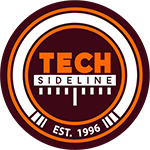From the well-played-out-news department: Hokie tight end Jeff King will suit
up for Seth Greenberg’s basketball team tonight, when VT takes on Bethune-Cookman
in Cassell Coliseum at 7 o’clock. This news has created quite a bit of
discussion among VT fans, not because they perceive a football player as a
savior of a struggling basketball team, but because King brings something the
hoopsters don’t have: in a word, bulk.
Jeff King isn’t a skyscraper in basketball terms. He’s “only” 6-5,
and the Hokies have eight players that are listed at 6-5 or taller (nine,
if you count 6-5 Markus Sailes, who is out for the year). But King is listed on
VT’s football roster at 263
pounds (256 in a recent Roanoke Times article), a whopping 35 pounds heavier
than VT’s next-heaviest player (Coleman Collins, 228) and almost 50 pounds
heavier than the next-heaviest player who sees significant playing time for Tech
(Allen Calloway, 215 pounds).
From that standpoint, Jeff King brings hope for a Hokie team that gets pushed
around a lot and has had trouble matching up with players like St. Johns’ Lamont
Hamilton (6-9, 242 — 24 points and 11 rebounds vs. VT) and Mississippi State’s
Lawrence Roberts (6-9, 240 — 25 points and 19 rebounds vs. VT).
Greenberg said in today’s Richmond
Times-Dispatch that he’s not sure how much King is going to play tonight:
“I’m not sure he’ll get an opportunity to play. He has to get up to
speed, get into basketball shape. Quite honestly, I haven’t evaluated him yet.”
King played his high school basketball at Pulaski County High School in
Dublin, VA, where he averaged 25 points and 14 rebounds as a senior in 2000-01,
despite being double- and triple-teamed on an undermanned PCHS squad. In a
February 1, 2001 Roanoke Times article, PCHS head coach Mark
Casseri was quoted as saying that King had had a double-double in every game his
junior season, plus every game to that point (16 games) in his senior season.
That’s somewhere in the neighborhood of 35-40 double-doubles in a row.
King even jacked up some threes as a senior, going 10-of-37 at the time the
Roanoke Times article was written. But don’t look for Jeff King to be hoisting
up three-pointers for the Hokies. Once he gets his feet under him and is ready
to play, he’ll be relied on for the thing the Hokies need most (other than age
and experience): size down inside.
Charlotte
Bowl Changing Name and Sponsors, from Continental Tire Bowl to Meineke Car Car Bowl
In an interesting piece of news Tuesday, Charlotte’s college football bowl game underwent a change of sponsors and
names, as Continental Tire bowed out, and the bowl will now be called the Meineke Car Care Bowl.
Meineke will have a three-year contract to sponsor the game, and though financial terms were not disclosed,
Continental Tire was paying $1 million a year to Raycom, which produces the game. The game is played at Bank of America Stadium, home of the NFL’s Carolina Panthers.
|
|
The bowl game, which has been in existence for three years now, is an unqualified success, at least financially.
While the bowl’s tie-in with the Big East has been problematic, given that Big East teams generally don’t travel well,
its tie-in with the ACC has been a windfall. Eight of the ACC’s 11 teams (12 starting next year) are within just a few
hundred miles of Charlotte, and in the bowl’s first three years, Virginia (in 2002 and 2003) and North Carolina have
bolstered attendance. The game has sold out two of its three years.
| Continental Tire Bowl History |
||||
| Season | ACC Rep | BE Rep | Att. | Result |
| 2002 | Virginia | West Virginia | 73,535 | UVA 48, WVU 22 |
| 2003 | Virginia | Pittsburgh | 51,236 | UVA 23, Pitt 16 |
| 2004 | UNC | Boston College | 73,367 | BC 37, UNC 24 |
With a total three-year attendance of nearly 200,000 fans (198,138), and assuming that about 10,000 tickets per year
are given away to corporate sponsors and the like, the Continental Tire Bowl has sold approximately 170,000 total
tickets in its first three years. If the average ticket price was $40, the bowl cleared about $6.8 million from ticket
sales. Add in $3 million in sponsorship money from Continental, and you can estimate that the Tire Bowl brought in
nearly $10 million just from tickets and Continental Tire’s sponsorship, while paying out $4.5 million over that same
time span to participating teams ($750k per team per game).
Media reports were not clear if the tie-in with the Big East will continue, but it appears that it will. With the
exception of WVU in 2002, Big East teams have traveled poorly to Charlotte. A December 10th Pittsburgh
Post-Gazette article pegged Pitt’s 2003 attendance at around 3,000 fans, and for this year’s game, the ACC Area
Sports Journal reported in their latest issue that bowl officials traced only 6,000-7,000 tickets directly to Boston
College fans. The ACC Area Sports Journal estimated UNC’s attendance at 65,000 for the game.
Chances are good that the Meineke Car Care Bowl will enjoy the same high attendance figures that the Continental Tire
Bowl enjoyed, helping to keep the game healthy financially, and perhaps leading to a higher payout in the future, since
it’s obvious that the bowl game is coming out ahead. The $10 million three-year revenue figure given above doesn’t
include sponsor income other than the title sponsor, nor does it include concession revenue, television revenue, or
licensing revenue. Revenue will be trimmed, of course, by expenses such as stadium rental fees and the costs of planning
and putting on the game, but regardless of expenses, surely the bowl has cleared millions of dollars in profit its first
three years.
There will be years where attendance suffers — you’ll no doubt be able to hear echoes in the stadium if a matchup
like, say, Boston College-Syracuse ever comes about — but for the most part, the game will continue to do well.












Tech Sideline is Presented By: